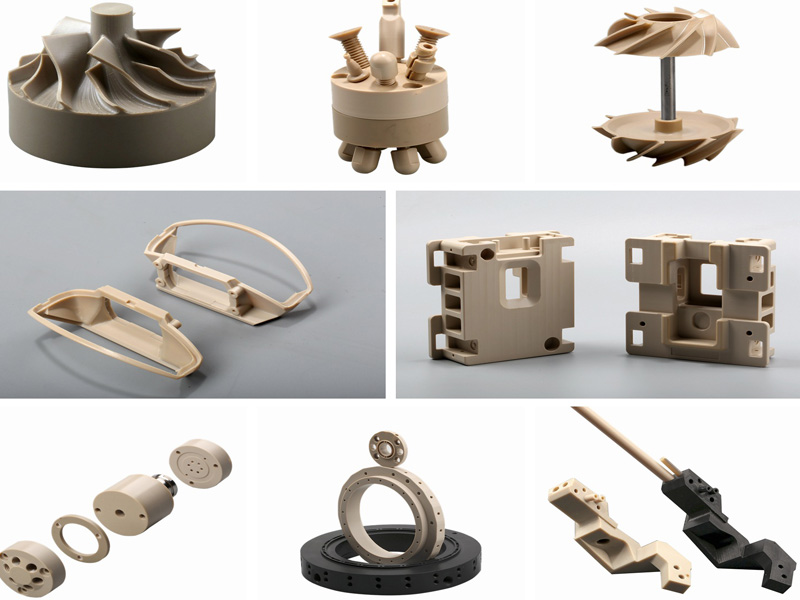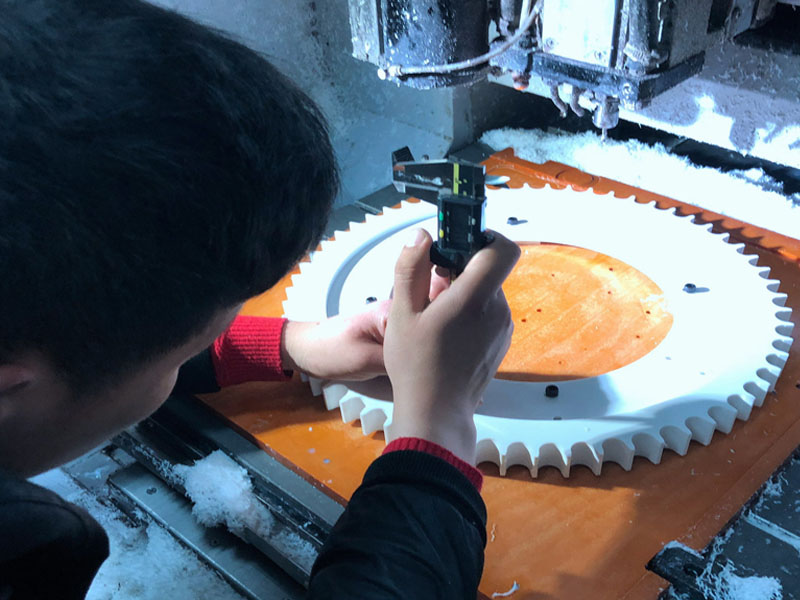Engineering plastics are used more and more widely in our daily life. Special engineering plastics are showing their skills in many high-precision industries, especially in the military industry. The application has been more and more. "We can see that engineering plastics have begun to replace many metals and become more valuable new materials. So what are the characteristics or advantages of engineering plastics in the processing process?

First, Speaking of features and advantages, let's start with what engineering plastics are
Plastic is a polymer organic material made of resin as the main body, filled with fillers (also called reinforcing agents) and additives, and made under heating and pressure. Engineering plastics are the sum of plastics that have higher strength than ordinary plastics and can meet special requirements. General engineering plastics are composed of three parts: resin, filler and additives. Certain types of engineering plastics have reached the strength of metal use, and the country has also issued corresponding support policies. "Plastic instead of steel", "Plastic instead of copper", and "Plastic instead of wood" are the future development trends of engineering plastics.
Second, the classification of engineering plastics
1. According to the nature of the resin: thermoplastic plastics, thermosetting plastics
A. Thermoplastics: This type of plastic melts or softens when heated, and then becomes hard after cooling. This process can be repeated many times. Thermoplastics include polyvinyl chloride, polypropylene, polyethylene, polystyrene and their copolymers ABS, nylon, polyoxymethylene, polycarbonate, chlorinated polyether, polyphenylene ether and polysulfone. They all have certain physical and mechanical properties. There are also some varieties such as fluoroplastics, polyimides, etc., which have very good corrosion resistance, excellent insulation and low friction coefficient. Thermoplastics have low heat resistance and rigidity
B. Thermosetting plastics: At a certain temperature, this type of plastics can be cured after heating for a period of time, and then adding a curing agent. The cured plastic has a hard texture, does not dissolve in a solvent, does not soften it when heated, and no longer has plasticity. It will also decompose if the temperature is too high. Thermosetting plastics include phenolic, unsaturated polyester, amino, epoxy, furan, silicone resin and PDAP. This type of plastic has good heat resistance and is not easily deformed under pressure.
2. According to the forming method: pressed plastic, laminated plastic
A. Pressed plastic: usually called glue (bakelite), it is a powder or fibrous semi-finished product based on thermoplastic resin or thermosetting resin and fillers, and then it is made into various types by using factory compression molding methods. Parts or profiles.
B. Laminated plastic: It is a sheet-like filler, such as paper, cotton cloth, glass cloth, etc., after being impregnated with synthetic resin, it is pressed into plastic by laminating. Laminated plastics include rubber paperboard, rubber cloth board, glass rubber cloth board and pipes, bars, etc. After machining, this plastic is widely used to make various parts.
Third, the characteristics of engineering plastics
1. Low density: The density of engineering plastics is generally 10%-25% of steel, and about 50% of aluminum. Light weight has very special significance for aerospace, aviation, shipbuilding and automobile industries;
2. Good insulation: most engineering plastics have good electrical insulation and arc resistance, and their insulation properties are comparable to those of ceramics and rubber. They are widely used in the electronics, electrical and electrical industries;
3. Excellent chemical properties: Engineering plastics are inert to acid and alkali, have good corrosion resistance, and are widely used in the chemical industry;
4. Good thermal insulation performance: The thermal conductivity of plastic is 0.2%-0.5% of steel, which has a good thermal insulation effect;
5. High specific strength: Some types of plastics are even higher than steel. The specific strength of engineering plastics with glass fiber as the base material is 5 times higher than that of Q235 steel and 2 times higher than that of high-strength aluminum;
6. Strong wear resistance: Engineering plastics have their own wear-resistant and anti-friction properties, which are used in bearings, gears and other parts, which are not only efficient and durable, but also have low noise;
Fourth, the characteristics of CNC machining of engineering plastics

1. Small cutting force, poor thermal conductivity and heat resistance: The cutting force in CNC machining of engineering plastics is 6-7 times smaller than that of metals. However, due to the low thermal conductivity and heat resistance of metals, the cutting speed is reduced accordingly to prevent plastics. Softening and sticking phenomenon;
2. Uneven organization and strength: Plastics are composed of multiple components, and there are many ways of expression of the constituent molecules, resulting in uneven organization, which is not conducive to processing, so the cutting edge of the tool needs to be sharper and more wear-resistant when cutting;
3. Severe tool wear and brittle cracking: engineering plastics add more fillers and additives, especially glass fiber, which will be more difficult to cut, and the tool will wear out quickly. After the tool is blunt, it will appear after the squeezing force is large. Cracking and chipping;
4. Large thermal expansion coefficient: The expansion coefficient of plastic is 3-4 times that of metal, which affects the stability of dimensions and brings difficulties to cutting;
5. Difficulty in chip breaking: During turning and drilling, the chips are in the form of bands, which will wrap around the tools and squeeze each other, which will affect the processing quality.
If you are also looking for cnc plastic machining service, please contact JY Machinery for more details.
Contact Us:
Email: info@jycncmachining.com
Phone number: +0086 158 8091 3506
Website: www.jycncmachining.com
Skype: hubery-nie
Whatsapp: +86 15880913506